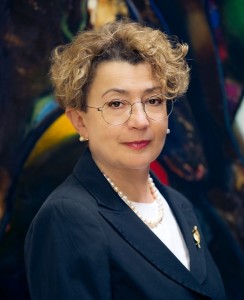
Recently US State Department special envoy for Holocaust affairs Nicholas Dean visited the Lithuanian Jewish Community. This was not just a coincidence. The rise of Holocaust denial in Lithuania was the reason for his visit. Jews from Lithuania and their offspring living in Israel and South Africa have been receiving negative answers regarding their applications for Lithuanian citizenship for some time.
As the questions mount over why one set of people have received Lithuanian passports while others haven’t, despite similar circumstances, the Lithuanian Foreign Ministry, the Interior Affairs Ministry, Migration Department officials and members of parliament have begun to investigate. While the law on citizenship says one thing, officials are saying other things, and one wonders why it is left to each individual bureaucrat to interpret history. Yet another revision of history is being carried out in Lithuania, which is an essential element in denials of the Holocaust. The vitality of anti-Semitism in Lithuania is shown by the way citizenship is restored, attempting to foist upon Jews who fled persecution that they left Lithuania for other reasons, not for political reasons, not for opposing the occupational regime, not because of persecution by that regime. Another example of the upturn in anti-Semitism is provided by Laisvas Laikraštis, a newspaper which prints openly anti-Semitic articles without commentary. The Community has lodged a complaint against the newspaper with the prosecutor, but no action has been taken.
Raimundas Pankevičius, a member of the Conservatives/Lithuanian Christian Democrat Party and leader of the Panevėžys faction of political prisoners and deportees, has gone to court for scandalous anti-Semitic statements made during a sitting of the Panevėžys city council. He is being tried for the public statement that Jews shot Jews in Lithuania during World War II. As if that weren’t enough, the group of former political prisoners and deportees who turned out to support Pankevičius at the trial attempted to protest loudly during the second court proceeding and were also charged with making an anti-Semitic attack. It is odd that no other member of the Panevėžys city council attended the trial. Attorneys working with the Lithuanian Jewish Community found Pankevičius’s public statements constituted an anti-Semitic attack distorting historical facts. Jews have asked for a public apology. The Jewish community has suffered many such statements made by Pankevičius against Jews over the years and only took the case to prosecutors after all patience was exhausted and it was no longer tolerable to suffer the constant insults.
Despite these unpleasant matters, which while not new nonetheless do cause pain and disappointment, we look forward to the holiday of Passover. The community must be united, and I speak to the young, the adults and the elderly. The community is strong when its members are loyal to the community. We must honor and respect one another. We are not many, but the community is our home and the common concern of all of us.
Passover is upon us, reminding us all of our sacred traditions and the opportunity to experience joy.
We remember the liberation of the Jews from the tyranny and brutality of the pharaoh of Egypt. Passover is the rebirth of the Jewish community. Jews around the world celebrate the holiday with joy. It is a beautiful time in the year when family and good friends get together to celebrate the miracle of freedom, sharing greetings of peace and joy. On this occasion I want to wish you, your families and your homes happiness, and to wish for more goodness of heart.
Celebrate the holiday together with your family. The haggadah is the Jewish text which explains the Passover seder to us. Reading the text at the seder table is a reminder to every Jew of the Torah’s injunction: “You shall tell your son on that day, ‘It is because of what the Lord did for me when I came out of Egypt.'”

